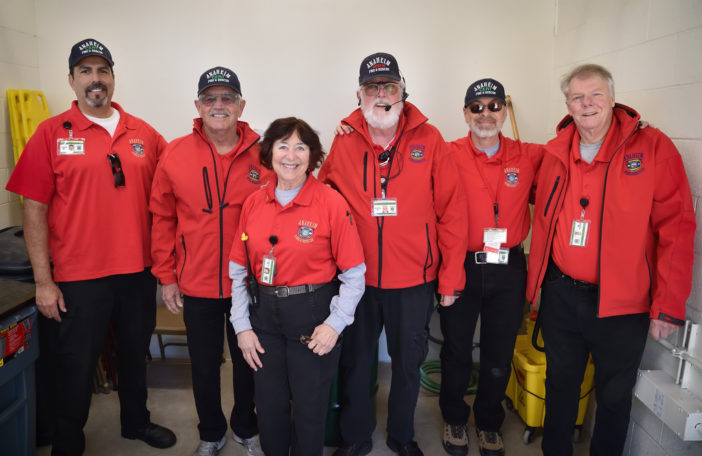Judy Huitt and Sandra Prentiss didn’t hesitate when they saw a request for volunteers to go to Paradise, Calif.
The Camp Fire, which killed 86 people and burned nearly 240 square miles in Butte County, had been extinguished nearly a month by the time they got the statewide call in December. Help was sorely needed for the 700-plus displaced residents, many of whom had no home to return to after the blaze was doused in late November.
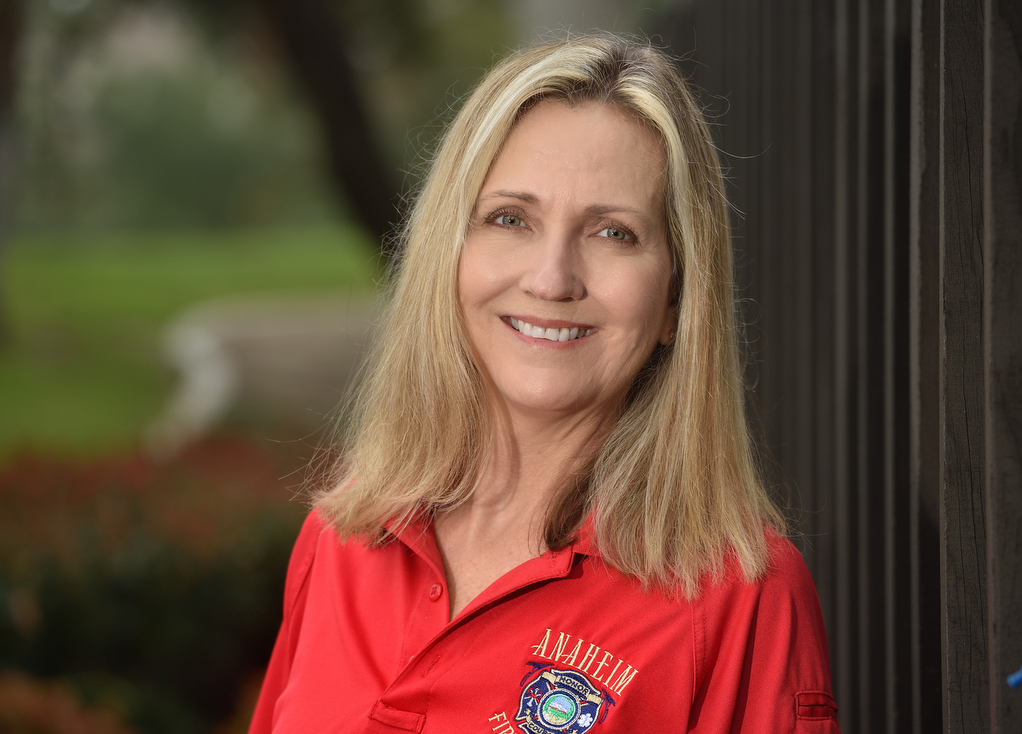
Anaheim CERT Volunteer Sandra Prentiss went to Butte County to help in the aftermath of the deadly Camp Fire.
Photo by Steven Georges/Behind the Badge
For Prentiss, it was personal – her home was threatened in the Canyon 2 Fire in October 2017.
“As soon as I saw the email I knew I was going to go,” Prentiss recalled. “I think I responded within the hour… I was just drawn to help, to do what I can.”
Huitt, a long-time Community Emergency Response Team (CERT) volunteer and team leader for the Pioneer Park area, had a friend living in Paradise.
“I knew she was up there and when I heard how devastating that fire was, I thought, ‘Whatever I can do to help, I’m happy to do so,’” Huitt said. “It was quite an experience.”
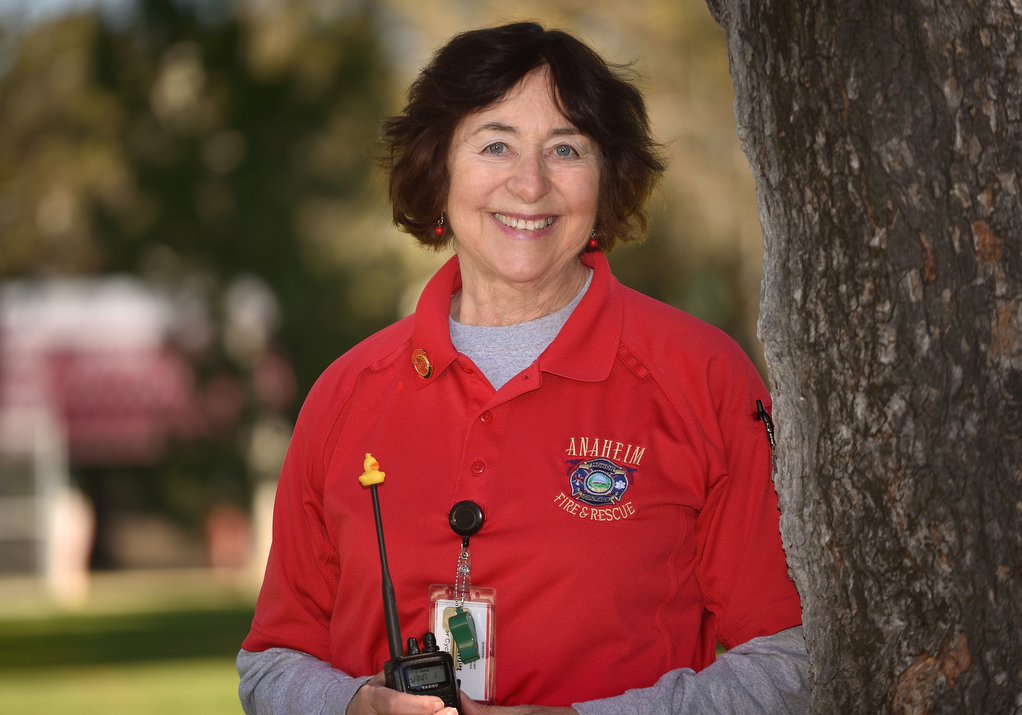
Anaheim CERT volunteer Judy Huitt went to Butte County to help residents in the aftermath of the deadly Camp Fire.
Photo by Steven Georges/Behind the Badge
Huitt and Prentiss are part of Anaheim’s CERT, which prepares residents to care for their families and neighbors during a disaster. They spent Dec. 27 to Jan. 4 in Butte County, sleeping on cots in tents, working 12-hour days, and getting to know those affected by the fires.
“It’s just beyond admirable to be able to make that selfless commitment to go help others,” said Sagar Patel, one of two administrative analysts for the city’s Emergency Management & Preparedness Section. “The City of Anaheim was proud to have two of our volunteers to represent us.”
About 70 people answered the state’s call for help, Patel said.
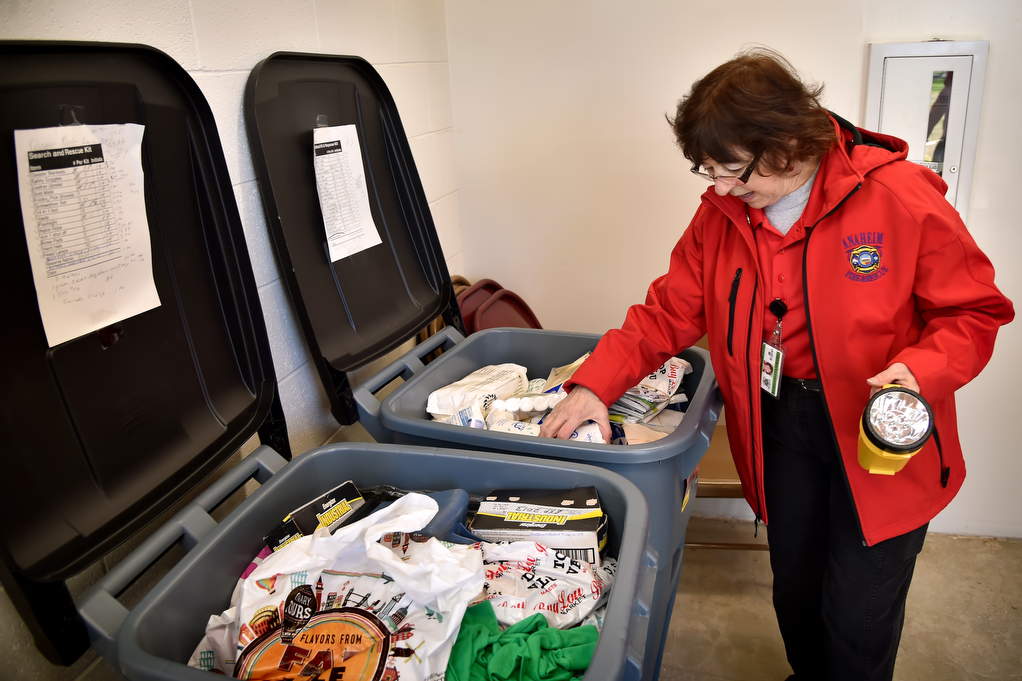
Anaheim CERT volunteer Judy Huitt inventories response kits and medical kits stored at parks for possible future community emergencies.
Photo by Steven Georges/Behind the Badge
“It was just absolutely amazing to see the people that turned out to help,” Huitt said. “Some people flew in at their own expense to help. It was absolutely amazing at dinnertime to see the variety of people… just wanting to do what they could to help.”
‘We can listen’
Huitt and Prentiss were stationed for a time in the massive Hope Center, a donation hub where people could ‘shop’ for food, clothing, jackets, scarves, hats, hygiene items, sleeping bags, shoes, backpacks, and more. Companies donated so many items that forklifts were needed to sort and move the supplies, and the center was restocked daily.
The Anaheim women were among many volunteers who helped restock supplies, accompany residents as they collected what they needed, and listen to the stories of those who came through.
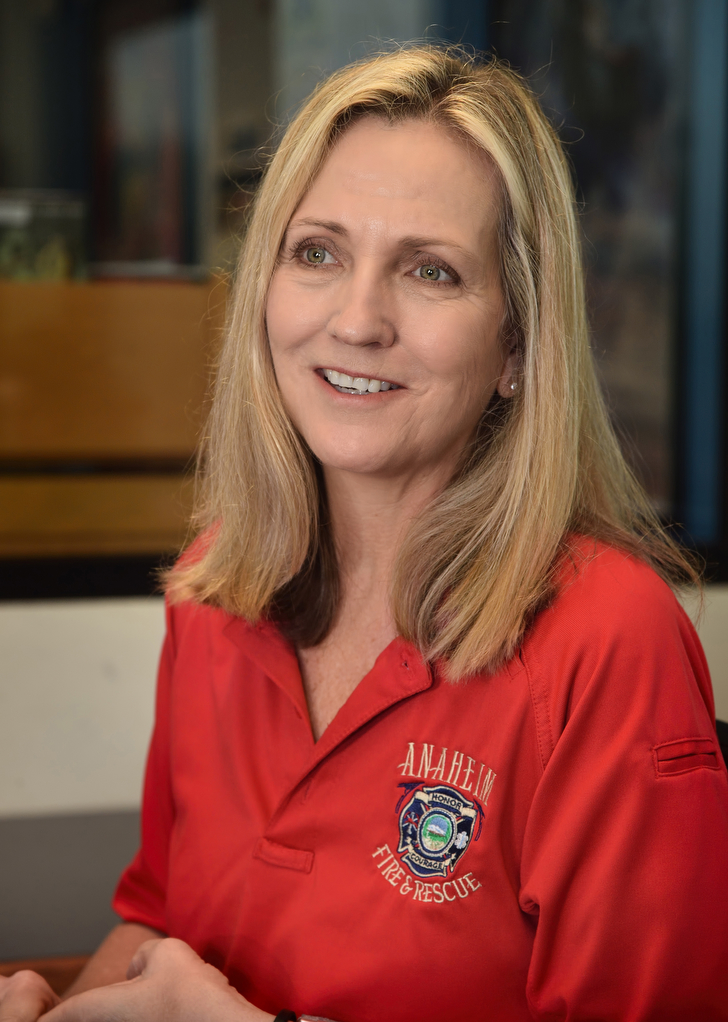
Sandra Prentiss talks about the time she spent in Paradise, Calif., helping as an Anaheim CERT volunteer after the Camp Fire last year.
Photo by Steven Georges/Behind the Badge
Many were reluctant to take more than a few items, Prentiss recalled.
“They were very, ‘Oh, save it for the next person,’” Prentiss said. “One woman only wanted things for her kids and I couldn’t get her to take things for herself. Everybody was very humble, and very thankful.”
“Some of them would tell their story,” she said. “They’re still heartbroken, and you hear some horrific stories. They saw things they can never unsee.”
Active listening was an important part of their work in Butte County – and a skill they learned in CERT classes.
“It was really, really tragic,” said Huitt, who was stationed for a time in the women’s shelter with 72 displaced women. Because the fire started in the early morning of Nov. 8, 2018, many evacuated with their nightclothes on, leaving purses, wallets, and important documents behind. “We only had two people that were able to leave the shelter during the nine days I was there.”
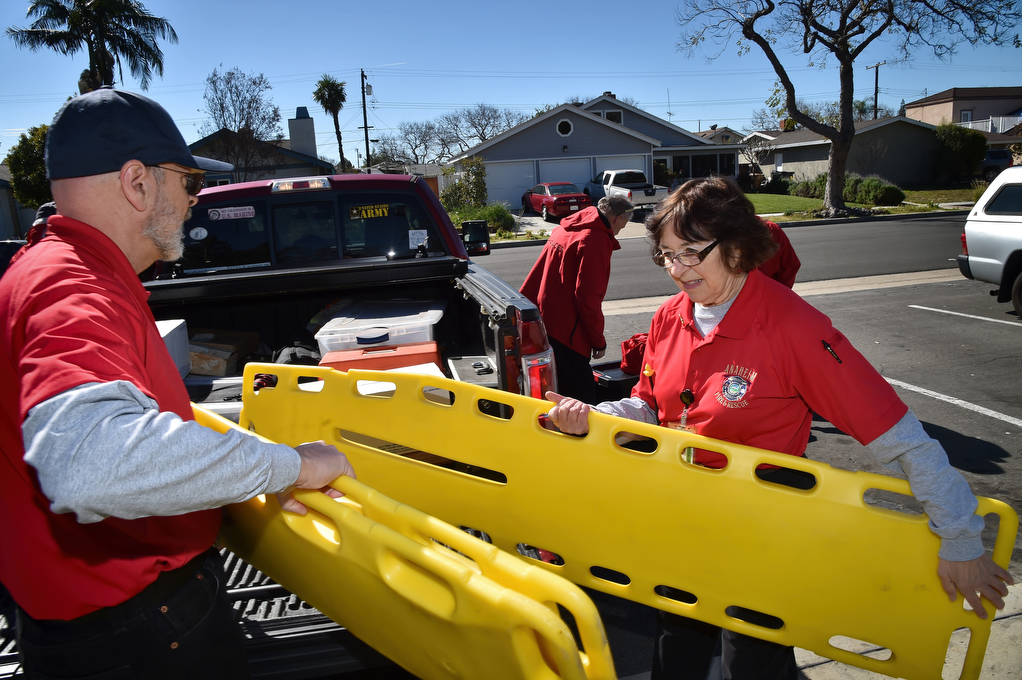
Anaheim CERT volunteers Paul Haupert, left, and Judy Huitt unload medical stretchers to be stored at parks for possible future emergency use.
Photo by Steven Georges/Behind the Badge
Officials from the California Office of Emergency Services, Federal Emergency Management Agency (FEMA), insurance companies, and other disaster relief groups such as the American Red Cross were on hand to help with relief efforts.
One woman who had left everything behind, including her passport, driver’s license, and proof she owned her home in Paradise, would declare every morning that today might be the day she could go to Pennsylvania to stay with family. She’d been in the shelter 55 days.
“And then tears would come down her face,” Huitt said. “Every day she needed to talk about it. So that’s what we did. We can’t solve the problems, but we can listen to the stories.”
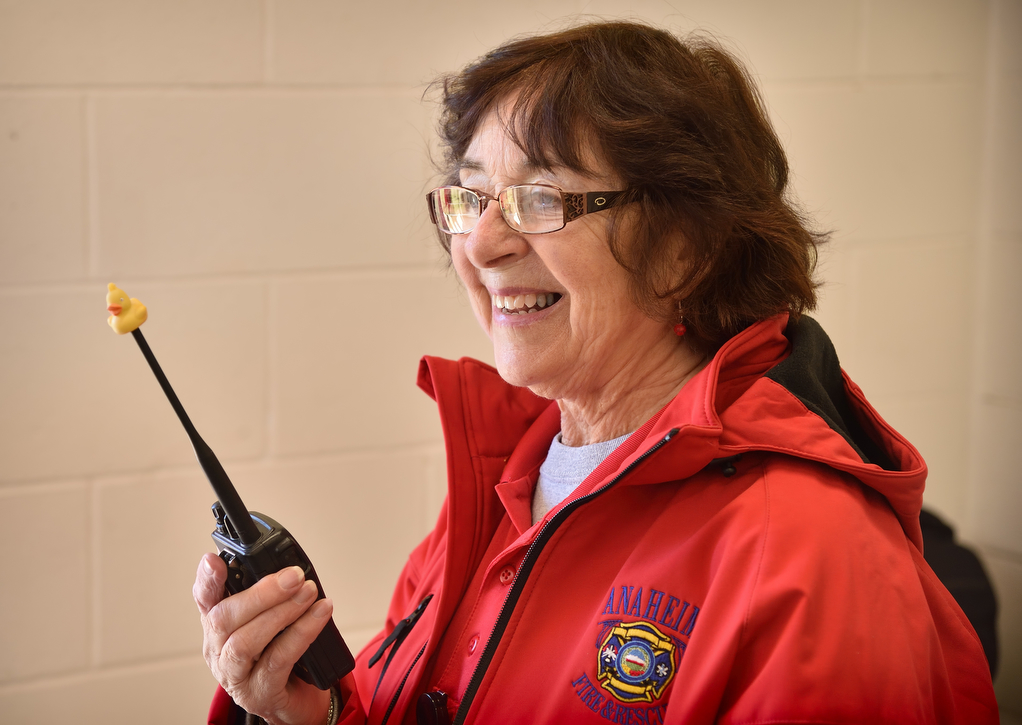
Anaheim CERT volunteer Judy Huitt. She and other CERT volunteers dedicate their time to monthly and quarterly trainings and meetings, as well as assisting at city events and during fire season.
Photo by Steven Georges/Behind the Badge
Preparing for the worst
Huitt and Prentiss both joined CERT to prepare their families for an emergency, as well as help neighbors.
“The CERT program’s basic premise is neighbors helping neighbors during disasters,” Patel said. “The focus is to really give you some fundamental training on disaster preparation, search and rescue, basic medical treatment, fire safety.”
For example, Huitt and Prentiss learned not to be dependent on electricity and to keep a manual can opener, water, and food handy. They now have a pair of tennis shoes and an emergency kit in their cars.
But they wanted to do more to help the community after completing the CERT curriculum, which is created by FEMA.
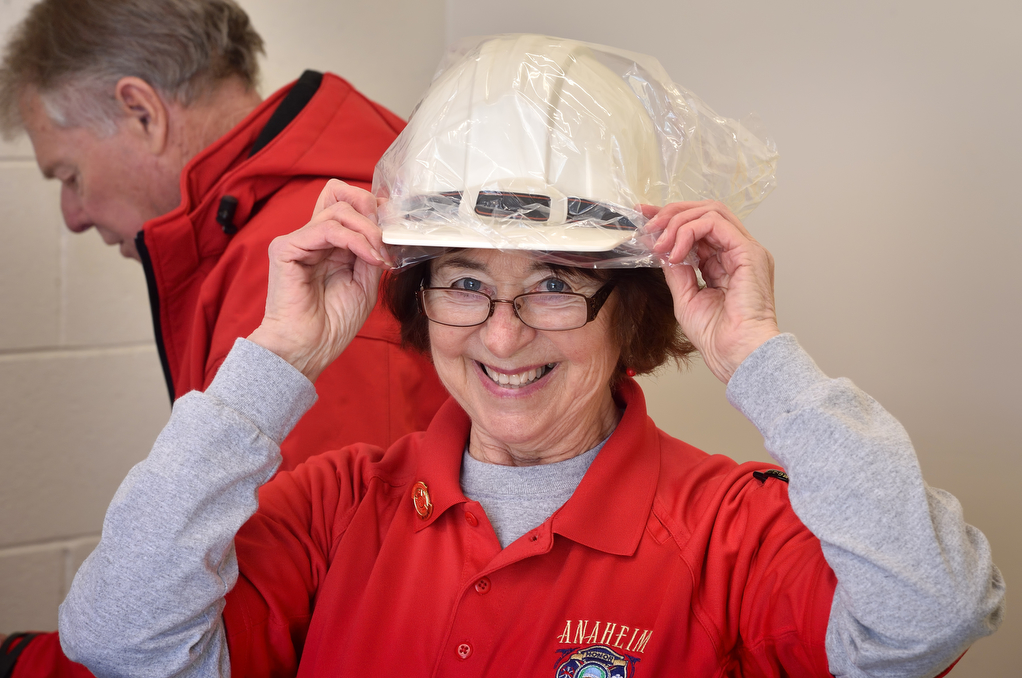
Anaheim CERT volunteer Judy Huitt during a CERT check-up of emergency supplies in city parks.
Photo by Steven Georges/Behind the Badge
Prentiss and Huitt are lifelong volunteers. Prentiss was a candy striper as a teenager, and as an adult was active in her children’s school Parent-Teacher Association. She currently works as a county volunteer coordinator.
Huitt is a CERT team leader, in addition to volunteering with the Red Cross, Anaheim’s Active Older Adult Programs, and Vitas Hospice in Irvine.
“I think everyone should take that class and some people will go on like me and some of the others and take the next steps so that we can try to be prepared so that we can help our neighbors,” Huitt said.
During an emergency, CERT volunteers – once their families are safe and cared for – check in on nearby daycares and elderly or sick neighbors until emergency services arrives. Nearly every Orange County city has a CERT program.
“Unfortunately, there’s not enough first responders during big disasters to go out and help every single individual,” Patel said. “That’s where personal preparedness and taking that initiative on your own really makes you ahead of the game during these disaster situations.”
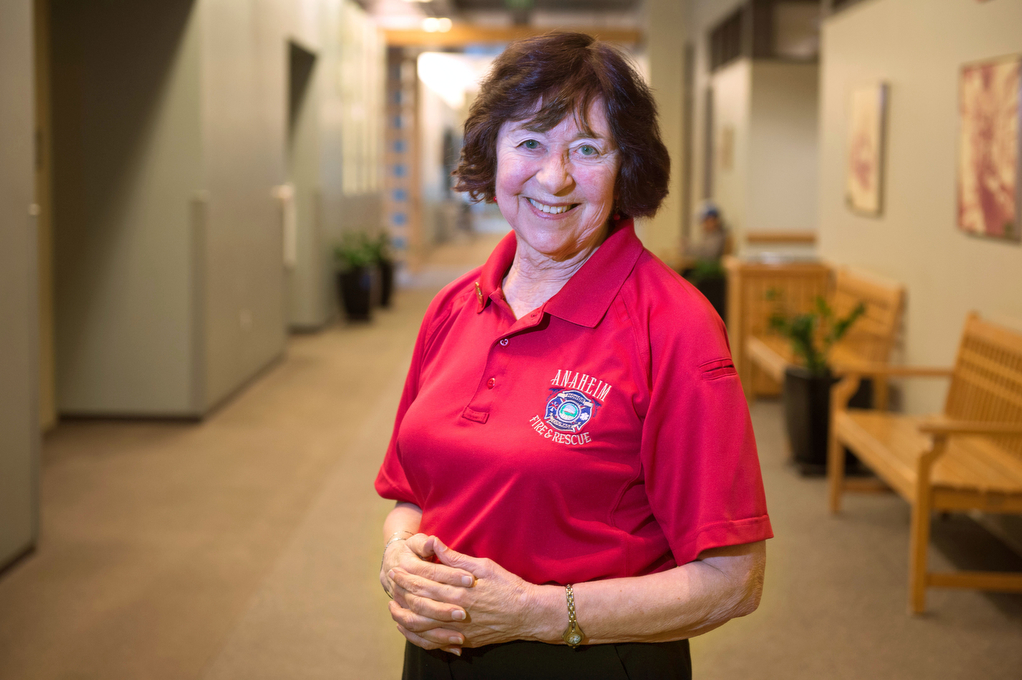
Anaheim CERT Volunteer Judy Huitt at the Anaheim Downtown Community Center. Huitt recently went to Butte County to help out in the aftermath of the recent Camp Fire.
Photo by Stephen Carr/Behind the Badge
The CERT commitment
Anaheim has trained thousands of people through its 20-hour free CERT program. Most don’t go on to become city volunteers, Patel said.
Volunteers must attend monthly meetings and quarterly trainings and drills, as well as volunteer a certain number of hours. Volunteers assist at parades and other large city events by providing first aid treatment and keeping vigilant for danger, and by monitoring wildland areas during wildfire season to identify suspicious activities and prevent arson as well as discover flareups early.
“CERT, like any other training, is something if you don’t practice on regular basis you can easily forget those skills,” Patel said.
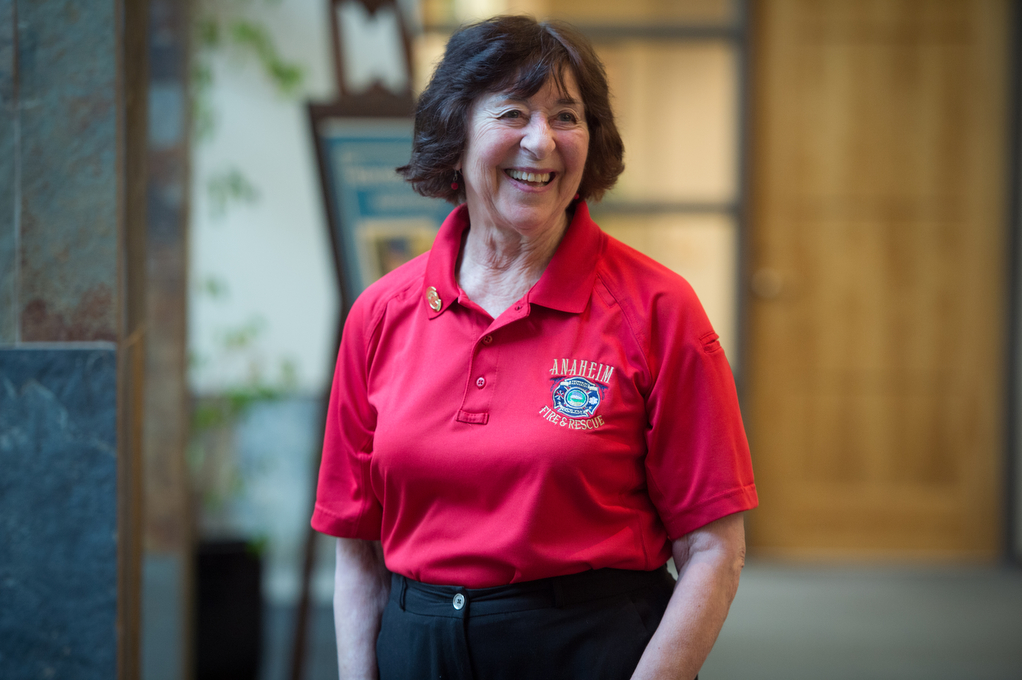
Anaheim Fire CERT Volunteer Judy Huitt at the Anaheim Downtown Community Center, where she volunteers with senior services. She recently went to Butte County to help in the aftermath of the recent Camp Fire.
Photo by Stephen Carr/Behind the Badge
Huitt and Prentiss gave a presentation to Anaheim’s CERT volunteers after they returned home. Their experience helps the city learn more about disaster preparedness and what to expect from the emergency management side, Patel said.
“I would just really encourage people to take a look at how things are going in the world around us today,” Patel said. “We’re seeing all sorts of different forms of disasters and emergencies happening… Have you put together a plan with your own family? Have you thought about where you’ll go, how you’ll communicate when other forms of communication are down? Ask yourself, ‘Do you really feel prepared?’”
Sign up for CERT and learn more at www.Anaheim.net/CERT.
 Behind the Badge
Behind the Badge
